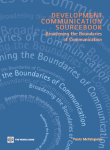
Development Communication Sourcebook: Broadening the Boundaries of Communication, written by Paolo Mefalopulos, published by The World Bank, Washington DC, 2008.
Why a Sourcebook on Development Communication?
The Development Communication Sourcebook aims to provide a clear understanding of the field of development communication and its more recent trends. It illustrates why this field is important and how its methods and tools can be applied effectively to enhance long-term results. The Sourcebook addresses everyone who has an interest in the success and sustainability of development initiatives, from communication practitioners to managers.
Two factors guided the rationale for writing the Sourcebook. First, despite the growing recognition enjoyed by the discipline of development communication, its nature and full range of functions are still not fully known to many decision makers and development managers who tend to identify this field merely with the art of disseminating information effectively. Second, because of the recent shift in the development paradigm (that is, from one-way to two-way communication) and the related changes in the field of development communication, many communication practitioners are not entirely aware of the discipline’s rich theoretical body of knowledge and the wealth of its practical applications—which are growing in relevance for the development context.
The Sourcebook is divided into modules that can be read sequentially, to gain a comprehensive overview, or individually, to allow readers to select specific modules for their professional interest or for training purposes. The challenge is to engage readers’ different interests while presenting the richness of development communication, which has broadened beyond diffusion to incorporate the more horizontal, dialog-based approaches needed to ensure mutual understanding and to investigate issues before other forms of communication take place.
| Attachment | Size |
|---|---|
| 1.55 MB |
-

- Log in to post comments
- 421 reads

